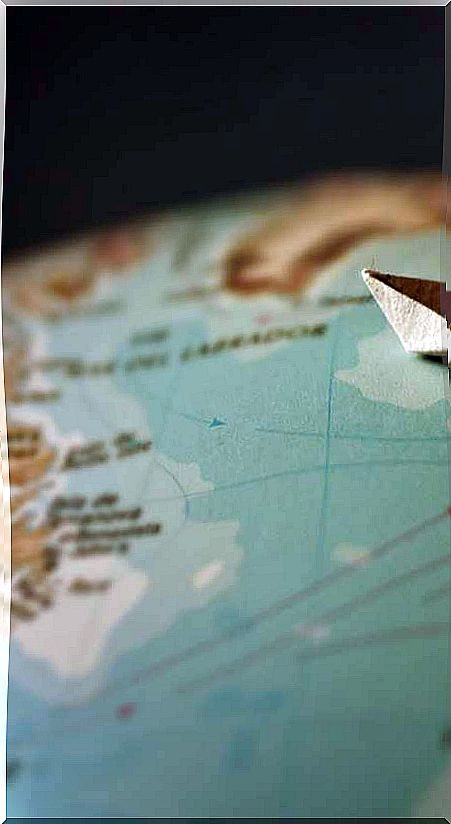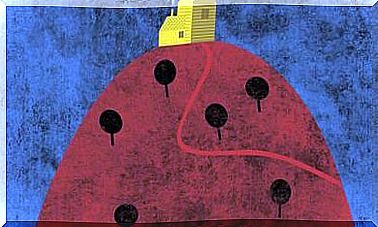Do You Feel Empty? Discover Your Mission
All cultures have made their search for the meaning of life. The answers found do not indicate any other direction than towards oneself.

The German philosopher Friedrich Nietzsche said, in one of his most famous aphorisms:
“who has a reason to live, can resist almost any how”
The problem is that many people lose sight of that “why”. In fact, it is something that everyone has experienced at some point in their existence.
When Viktor Frankl, the psychiatrist who created logotherapy, spoke of the importance of finding our mission in life, he was not referring to professional fulfillment or other aspects of outer life, but to discovering that inner flame that illuminates the path we take. we must continue.
Many patients asked him: “What if I don’t know what my mission in life is?”, To which Frankl replied: “In that case you already have one: find out what it is.”
What is the meaning of life?
Finding the meaning of life has been a human concern since the first cultures of which we have a trace. The very existence of religions has its origin in the search for that meaning beyond daily efforts.
The meaning of life, according to religions
In monotheistic religions, for example, surrender to others and love for the Creator would be rewarded with reaching a kingdom of heaven that, according to modern interpretations, could also refer to a more evolved state of consciousness, free from the slavery of desire. and from attachments.
The perfection of oneself, as a vital objective, is also present in Hinduism and Buddhism, which consider that we continue on this path of improvement over several lives. The mission of the individual would be to live an existence as elevated as possible to climb a rung in the next reincarnation.
The meaning of life, according to philosophy
But what happens if we don’t believe in God or in another life other than this one? This search is not exclusive to religious thought; lay thinkers have also dealt with it.
The Spanish philosopher José Ortega y Gasset stated the following in one of his best-known essays: “Life is given to us, since we do not give it to ourselves, but we find ourselves in it suddenly and without knowing how. life that is given to us is not given to us made, but we need to make it ourselves, each one his own “.
To “make” one’s life means to trace a path that is worth walking. Just as the lover discovers magic in everything that surrounds him, admiring the daily wonders that were previously invisible to him, reality also becomes radiant for those who have a personal mission.
Excited parents of a baby, an artist on the brink of creativity, or a helper who sees the beneficial result of their actions are examples of people who embrace their mission in life. However, for most human beings there are many moments in which that inner beacon goes out and we stop understanding where we are sailing, and even the reason for the journey itself.
Existential emptiness
Although existential emptiness is not exclusive to adolescence, the transition from child to adult is often accompanied by a feeling of being lost in no man’s land. The safety and warmth of childhood are left behind, but we still do not understand the rules of the game of the adult world.
Somehow, we have killed the old gods without yet having new gods.
In ancient cultures, the “rite of passage” was favored to facilitate this transition. The young man was left lost in a forest to face his fears and, in solitude, find a new meaning in his life. This symbolic adventure was a metaphor for our own existence, in which crises, accidents and obstacles are tools to get to know ourselves better and transform our consciousness.
This process continues throughout life in a subtle way, since throughout our existence there are real and symbolic deaths, and all kinds of rebirths. .. When we stop having our parents, after a sentimental breakup, or when losing a job To which we have dedicated a good number of years, there is that void that asks to be filled with a new vital vision.
Initiatory journey
Hermann Hesse poetically narrated, in his work Demian, the initiatory journey that every human being makes, even if they are often unaware of it:
“The life of every man is a path towards himself, the attempt of a path, the outline of a path (…). All carry with them, until the end, the remains of their birth, viscosities and eggshells of a world Some never become men; they remain frog, lizard or ant. Others are half man and half fish. But each one is an impulse of Nature towards man. We all have common origins: mothers; we all come from from the same abyss, but each tends to his own goal. “
Realizing that living path in which we are making ourselves will help us to find the goal that gives meaning to the whole journey.
The meaning of life, today
The most famous contemporary fable about the search for the meaning of life is The Alchemist by Paulo Coelho, which tells the journey of a young pastor who, after sleeping in an abandoned church, dreams of a treasure and goes on a trip to find it.
What many readers don’t know is that Coelho was based on an old Hasidic tale called The Dream of Rabbi Aizik, collected by Martin Buber, an Austro-Hungarian Jewish writer and philosopher.
After living in extreme poverty for many years without weakening his faith in God, one night Rabbi Aizik dreamed that someone asked him to go to Prague to look for treasure under the bridge that leads to the king’s palace. When the dream was repeated for the third time, Aizik prepared for the trip and left for Prague.
But the bridge was guarded day and night, and he dared not start digging. However, he would go there every morning and hang around until dark. Finally, the captain of the guards, who had been watching him, asked him in a good way if he was looking for something or waiting for someone.
Rabbi Aizik told him about the dream that had brought him from a distant country. The captain of the guards then laughed heartily and said to him: “So by obeying a dream, you, poor friend, have worn the soles of your shoes to get here? And as for having faith in dreams? … I too, had I had it, would have left when I once dreamed that I should go to Krakow and dig for treasure under the stove in the room of a Jew named … Aizik, son of Iekel! Imagine what would have happened I would have had to dig in all the houses around there, where one half is called Aizik and the other half is Iekel! ” And the captain laughed again.
Stunned by this revelation, Rabbi Aizik said his goodbyes and hurried back home. Once there, he dug under the stove and found the treasure. Many years later, Rabbi Bínam made a wise reflection on this story: there is something that you cannot find anywhere in the world.
And there is, however, a place where you can find it. This treasure that is so close that we are often not able to see it is the same that the German professor of philosophy Eugen Herrigel – who made Zen known to Western audiences – would learn from his archery teacher in his final lesson, in Japan in the second decade of the 20th century.
After five years of hard training in the woods, trying to drive the arrow into the target, the teacher revealed to Eugen Herrigel that, deep down, “the archer is aiming at himself.” This is how he indicated the ultimate mission of which the ancient philosophers already spoke: to surpass himself.
It is the best challenge that we all have ahead









